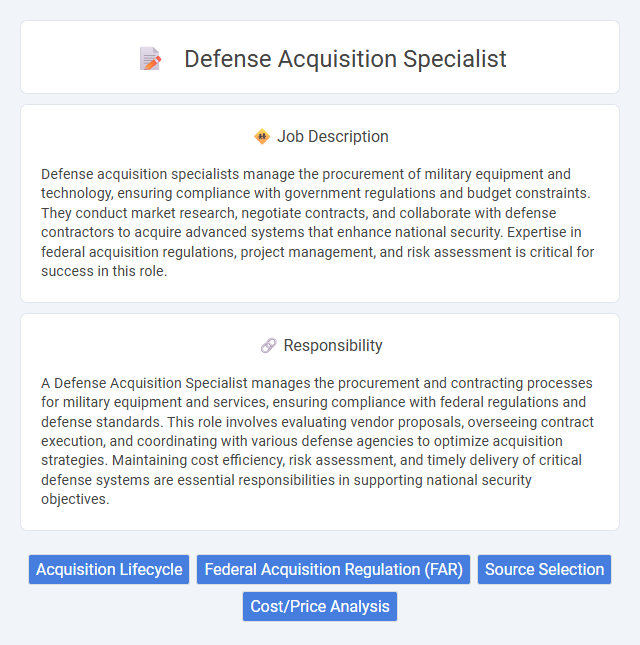
Defense acquisition specialists manage the procurement of military equipment and technology, ensuring compliance with government regulations and budget constraints. They conduct market research, negotiate contracts, and collaborate with defense contractors to acquire advanced systems that enhance national security. Expertise in federal acquisition regulations, project management, and risk assessment is critical for success in this role.
Individuals with strong analytical skills and a detail-oriented mindset are likely well-suited for a Defense Acquisition Specialist role, given the need to navigate complex procurement processes and regulations. Those comfortable working under pressure and managing multiple priorities may find this career fulfilling, as it often involves coordinating with various stakeholders and ensuring compliance with defense standards. People lacking patience for intricate documentation or interest in government contracting might face challenges adapting to this field.
Qualification
A Defense Acquisition Specialist typically requires a bachelor's degree in fields such as aerospace engineering, business administration, or logistics management, coupled with extensive knowledge of federal acquisition regulations (FAR) and defense procurement processes. Certification programs like the Defense Acquisition Workforce Improvement Act (DAWIA) Level II or III are highly valued, demonstrating expertise in contract management, program management, or systems acquisition. Strong analytical skills, experience with project lifecycle management, and proficiency in government procurement systems such as the Defense Contract Management Agency (DCMA) software enhance qualifications for this role.
Responsibility
A Defense Acquisition Specialist manages the procurement and contracting processes for military equipment and services, ensuring compliance with federal regulations and defense standards. This role involves evaluating vendor proposals, overseeing contract execution, and coordinating with various defense agencies to optimize acquisition strategies. Maintaining cost efficiency, risk assessment, and timely delivery of critical defense systems are essential responsibilities in supporting national security objectives.
Benefit
A Defense Acquisition Specialist likely benefits from stable government employment with competitive salaries and comprehensive healthcare coverage. Opportunities for professional development and access to cutting-edge defense technology may enhance career growth and job security. The role probably offers a strong sense of purpose by contributing to national security efforts.
Challenge
A Defense Acquisition Specialist likely faces the challenge of managing complex procurement processes under strict regulatory requirements and tight deadlines. Navigating the evolving technology landscape while ensuring cost-effectiveness may present ongoing difficulties. Balancing the needs of multiple stakeholders and mitigating risk in high-stakes contracts might require advanced strategic and analytical skills.
Career Advancement
A Defense Acquisition Specialist plays a critical role in managing procurement processes for military systems and technology, ensuring compliance with federal regulations and standards. Career advancement in this field often involves obtaining certifications such as the Defense Acquisition Workforce Improvement Act (DAWIA) levels, gaining experience in program management, and developing expertise in contract negotiation and cost analysis. Progression typically leads to senior acquisition management roles, where specialists oversee large-scale defense projects and influence strategic procurement decisions.
Key Terms
Acquisition Lifecycle
A Defense Acquisition Specialist manages the Acquisition Lifecycle by overseeing requirements definition, procurement planning, and contract award processes to ensure timely delivery of defense systems. Key phases include research and development, testing and evaluation, production, and sustainment, all guided by Defense Acquisition Regulations. Proficiency in program management, compliance with federal acquisition standards, and coordination with stakeholders are essential for optimizing cost, schedule, and performance across the lifecycle.
Federal Acquisition Regulation (FAR)
A Defense Acquisition Specialist expertly manages procurement processes in compliance with the Federal Acquisition Regulation (FAR), ensuring adherence to federal guidelines for government contracts. They analyze contract requirements, prepare solicitations, and negotiate terms to optimize acquisition outcomes while mitigating risks. Proficiency in FAR clauses, cost principles, and contract administration is essential for effective acquisition lifecycle management in defense procurement.
Source Selection
Defense acquisition specialists play a crucial role in source selection, ensuring that procurement decisions align with federal regulations and defense requirements. They conduct thorough evaluations of bids and proposals, analyzing factors such as cost, technical capability, and past performance to identify the most qualified contractors. Expertise in Federal Acquisition Regulation (FAR) and Defense Federal Acquisition Regulation Supplement (DFARS) is essential to maintain transparency and integrity throughout the source selection process.
Cost/Price Analysis
A Defense Acquisition Specialist specializing in Cost/Price Analysis performs thorough evaluations of contract proposals to ensure fair pricing and optimal use of defense budgets. They analyze cost elements, conduct market research, and apply cost estimating techniques to support decision-making processes for military procurement. Proficiency in government acquisition regulations and experience with defense contract pricing models are essential for accurate cost assessment and effective negotiation.
 kuljobs.com
kuljobs.com